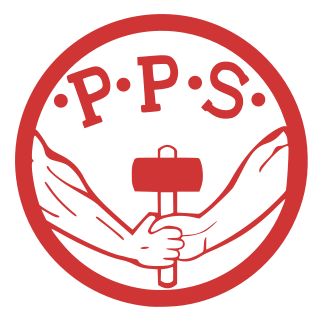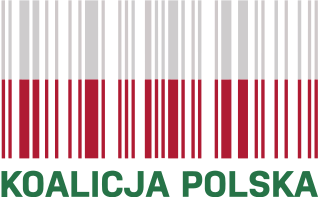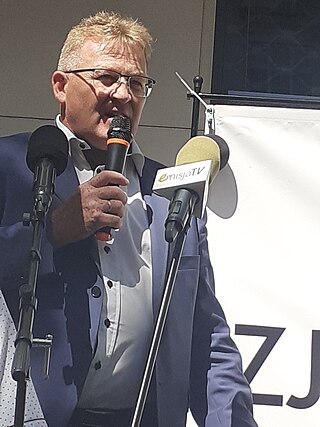National Democracy was a Polish political movement active from the second half of the 19th century under the foreign partitions of the country until the end of the Second Polish Republic. It ceased to exist after the German–Soviet invasion of Poland of 1939. In its long history, National Democracy went through several stages of development. Created with the intention of promoting the fight for Poland's sovereignty against the repressive imperial regimes, the movement acquired its right-wing nationalist character following the return to independence. A founder and principal ideologue was Roman Dmowski. Other ideological fathers of the movement included Zygmunt Balicki and Jan Ludwik Popławski.

The Polish Socialist Party is a socialist political party in Poland.

Robert Biedroń is a Polish politician, former mayor of Słupsk, and LGBT activist who has been serving as a Member of the European Parliament since 2019. He is the Chair of the Committee on Women's Rights and Gender Equality (FEMM) in the European Parliament.

The National Radical Camp was an ultranationalist and antisemitic political movement which existed in the pre-World War II Second Polish Republic, and an illegal Polish anti-communist, and nationalist political party formed on 14 April 1934 mostly by the youth radicals who left the National Party of the National Democracy movement.
The Polish Communist Party, or the Communist Party of Poland, is an anti-revisionist Marxist–Leninist communist party in Poland founded in 2002 claiming to be the historical and ideological heir of the Communist Party of Poland, Polish Workers' Party and the Polish United Workers' Party.
The United Left was a political and electoral alliance of political parties in Poland.

Left Together is a left-wing political party in Poland.

Parliamentary elections were held in Poland on 13 October 2019. All 460 members of the Sejm and 100 senators of the Senate were elected. The ruling Law and Justice (PiS) retained its majority in the Sejm, but lost its majority in the Senate to the opposition. With 43.6% of the popular vote, Law and Justice received the highest vote share by any party since Poland returned to democracy in 1989. The turnout was the highest for a parliamentary election since the first free elections after the fall of communism in 1989. For the first time after 1989, the ruling party controlled one house, wile the opposition controlled the other.
The Civic Coalition is a catch-all political alliance currently ruling in Poland. The alliance was formed around Civic Platform in opposition to the then-ruling Law and Justice (PiS) party.

On Sunday 26 May 2019, a vote was held to elect the Polish delegation to the European Parliament. Polish voters elected 52 MEPs, compared to 51 in the 2014 election. The increased number of MEPs is a result of the 2018 reapportionment of seats in the European Parliament. Following the United Kingdom's announcement, that it will participate in elections to the European Parliament on May 23, Poland will continue to be represented by 51 MEPs. The 52nd MEP will take up their mandate immediately after the UK leaves the European Union. Following the announcement of the election results, the National Electoral Commission indicated Dominik Tarczyński from Lesser Poland and Świętokrzyskie will take up the 52nd seat.

The Polish Coalition is a political alliance in Poland. It is led by the Polish People's Party.

The Left is a political alliance in Poland. Initially founded to contest the 2019 parliamentary election, the alliance now consists of the New Left and Left Together.

Włodzimierz Czarzasty is a Polish politician who serves as the co-chairperson of the New Left party. He has been serving as a Deputy Marshal of the Sejm since 12 November 2019.
Lech Wałęsa Institute is a non-governmental, non profit organization established in 1995 by Lech Wałęsa, Nobel Peace Prize Laureate and a first democratically elected President of the Republic of Poland.
Szymon Hołownia's Poland 2050 is a centrist political party in Poland.

The New Left is a social-democratic political party in Poland. It is positioned on the centre-left on the political spectrum. Its leaders are Włodzimierz Czarzasty and Robert Biedroń.
New Democracy - Yes is a progressive political movement in Poland formed by Marek Materek, the president of Starachowice formerly associated with the Civic Platform and Polish People's Party. The party campaigns on breaking the Polish political "duopoly" of the United Right and Civic Coalition and wishes to appeal to undecided voters and those who would not vote otherwise. The party focuses on reforming and decentralising the Polish administration while supporting regional movements and autonomy proposals, and is composed of local mayors and regional activists. The party is highly critical of the ruling Law and Justice (PiS) party for causing the Polish constitutional crisis, and wishes to restore "the real dimension of democracy" in Poland.

Social Justice Movement (RSS) was a Polish radical left-wing socialist political party. It was founded by Piotr Ikonowicz on 2 May 2014. and registered on 5 September 2014. The main tenet of the party was to represent the poorest and weakest in Polish society and to fight "against social exclusion, inequality and economic exploitation". The party was active politically and formed electoral lists together with other minor left-wing parties, but it never managed to gain any seats. It was deregistered on 6 February 2023.

Wacław Klukowski is a Polish politician, government official, and farmer who served as a member of the Sejm of the Republic of Poland during the fourth convocation. He was also a councilor in the West Pomeranian Voivodeship.











